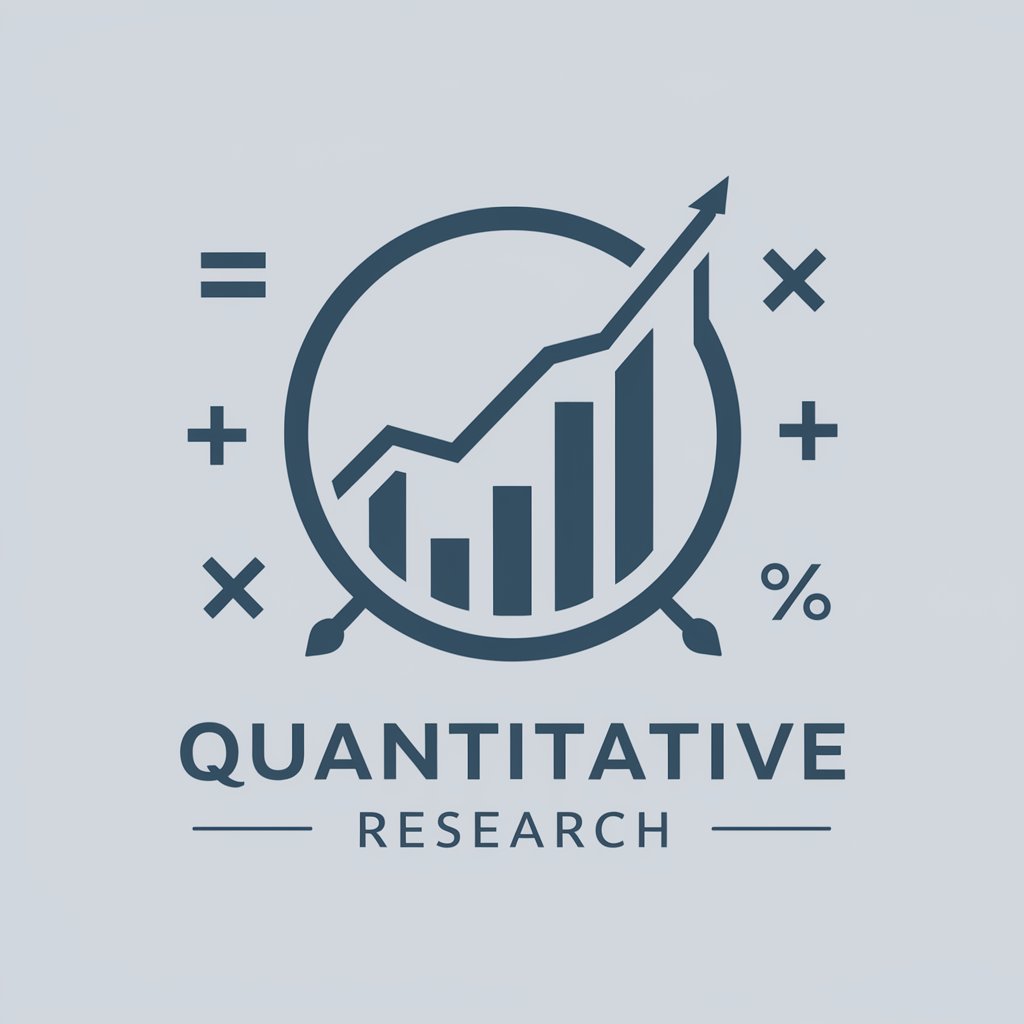Quantitative Research - Quantitative Data Analysis

Hello! I'm here to help with all your quantitative research needs.
Empowering data-driven decisions with AI
Explain the difference between descriptive and inferential statistics.
How can I test the significance of my regression model?
What are the best practices for data cleaning before analysis?
Can you describe the steps for conducting a hypothesis test?
Get Embed Code
Quantitative Research Explained
Quantitative Research refers to the systematic empirical investigation of observable phenomena via statistical, mathematical, or computational techniques. The primary objective is to quantify relationships, test hypotheses, and examine theories by employing structured data collection instruments that produce reliable, numerical data. This method is distinguished by its ability to produce measurable and comparable results, allowing researchers to generalize findings from a sample to a larger population. For example, a market researcher might use surveys to quantify the number of consumers preferring one product over another, or an epidemiologist might analyze dataset trends to understand the spread of a disease within a population. Powered by ChatGPT-4o。

Core Functions of Quantitative Research
Data Collection
Example
Surveys, questionnaires, and structured interviews.
Scenario
A corporation conducts an online survey to understand customer satisfaction levels across its services. This process involves the distribution of a standardized questionnaire to a large sample of its customer base, aiming to collect quantifiable data on customer perceptions and experiences.
Statistical Analysis
Example
Descriptive and inferential statistics.
Scenario
A public health researcher analyzes infection rates from collected data during a flu season. By applying statistical techniques, they identify trends, calculate averages, and infer the potential impact of vaccination on reducing infection rates, thereby supporting public health decision-making.
Hypothesis Testing
Example
T-tests, ANOVA, regression analysis.
Scenario
An educational institution uses regression analysis to test the hypothesis that student performance is significantly affected by the number of hours spent in structured study groups. By comparing the academic outcomes of students participating in study groups versus those who do not, the institution aims to evaluate the effectiveness of these groups.
Who Benefits from Quantitative Research?
Academics and Researchers
Individuals in academic or research positions across various fields such as social sciences, health sciences, and engineering. They benefit from quantitative research by using it to test theories, validate experimental results, and contribute to knowledge within their respective domains.
Market Analysts and Business Strategists
Professionals who rely on data to understand market trends, consumer behavior, and the effectiveness of business strategies. Quantitative research provides them with the empirical evidence needed to make informed decisions, predict market movements, and evaluate the impact of marketing campaigns.
Policy Makers and Public Administrators
Individuals in government or non-governmental organizations who utilize quantitative research to inform policy development, assess program effectiveness, and make decisions that impact public welfare. By analyzing data on social, economic, and health indicators, they can craft policies based on evidence rather than conjecture.

Guidelines for Using Quantitative Research
Start Your Journey
Initiate your quantitative research experience by visiting yeschat.ai for a complimentary trial, bypassing the need for any login or subscription to ChatGPT Plus.
Define Your Research Question
Clearly articulate the research question or hypothesis you aim to explore. This foundational step guides the entire research process, ensuring focus and relevance.
Collect Numerical Data
Gather data through surveys, experiments, or existing databases. Emphasize the importance of a sizable and representative sample to ensure the reliability of your findings.
Analyze Your Data
Employ statistical tools and software to analyze your data. This might involve descriptive statistics, inferential statistics, or predictive modeling, depending on your research objectives.
Interpret and Report
Interpret the results in the context of your research question. Conclusively report your findings, discussing their implications, limitations, and suggestions for future research.
Try other advanced and practical GPTs
なにわ男士【NANIWA DANSHI】
Brighten Your Day with AI-powered Kansai Warmth

Green Smoothie Guru
Blend Your Way to Health with AI

Solar Power
Illuminate Your World with AI-Powered Solar Insights

Sustainable Energy Expert
Empowering sustainability with AI-driven insights.

IKITOMU Circular Sage
Empowering eco-friendly decisions with AI wisdom.

Sustainable Fashion Creator
Crafting Eco-Chic with AI

Voyage Aid
Empowering Fundraising with AI

First Aid
Empowering You with AI-Powered First Aid

LocalBuzz
AI-powered, personalized local discovery

News Navigator
Navigate News with AI Precision

First Aid Tutor
Empowering lifesaving skills with AI

Counselor's Corner Chat
Empowering Educators and Therapists with AI

Quantitative Research Q&A
What is Quantitative Research?
Quantitative research involves the collection and analysis of numerical data to understand patterns, relationships, or trends. It's often used to test hypotheses, assess phenomena, or predict outcomes based on statistical analysis.
How do I select the appropriate statistical test for my data?
The selection of a statistical test depends on your research question, the type of data collected (nominal, ordinal, interval, or ratio), and the distribution of your data. Common starting points include t-tests for comparing means, chi-square tests for categorical data, and regression analysis for relationships between variables.
Can Quantitative Research be used for predictive modeling?
Yes, predictive modeling is a key application of quantitative research, utilizing historical data to make predictions about future events. Techniques such as linear regression, logistic regression, and machine learning algorithms are commonly employed.
What is the significance of sample size in Quantitative Research?
The sample size impacts the reliability and validity of your research findings. Larger sample sizes generally provide more accurate estimates of the population parameters and increase the power of statistical tests, reducing the likelihood of Type II errors.
How do I ensure the ethical integrity of my quantitative research?
Ensure ethical integrity by obtaining informed consent from participants, maintaining confidentiality and anonymity, avoiding biased or leading questions in surveys or questionnaires, and accurately reporting data without manipulation.
